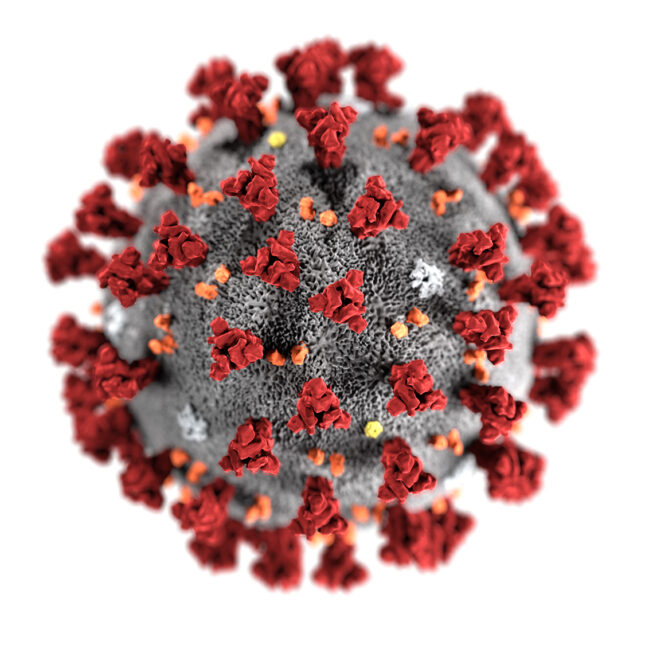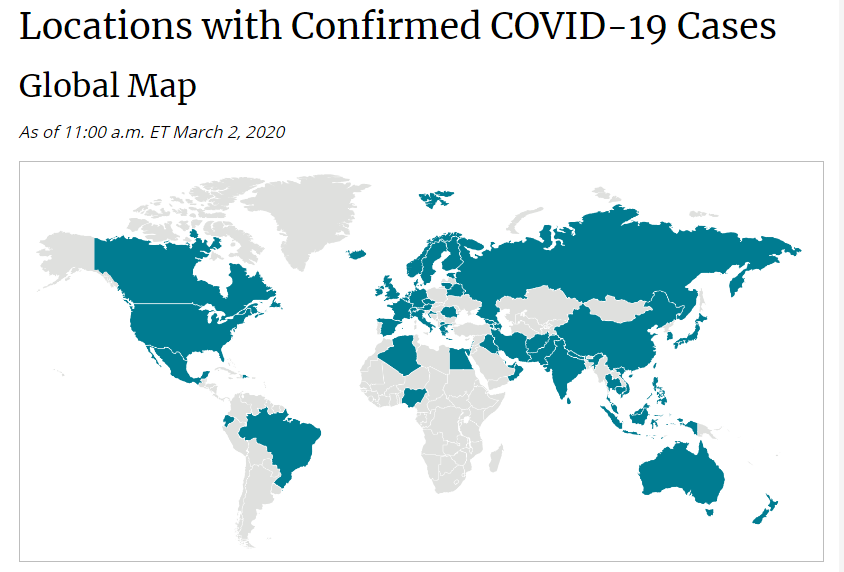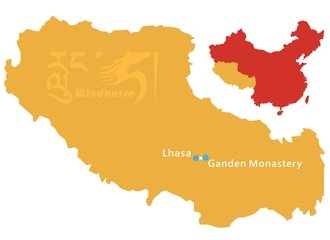Coronavirus Update 3/4/2020

Dear valued clients,
As we promised, we will inform you about the situation with coronavirus Covid-19 in China and the world.
The rules about traveling in China and the province Hubei are still on, so the travel agencies can not sell any tour packages.
Wuhan and the other 15 cities are still under quarantine, and the virus is still spreading among people. Although, in the past two weeks, there are more recovered people from the virus than deaths.

The current situation with Covid-19 in China and from the rest of the world in numbers (03/03/2020):
- Total worldwide infected cases are 91.347, total recovered are 48.284, and total deaths are 3.120.
- China has reported 2,742 new discharges occurred in China on March 2, and 128 new cases, 31 new deaths (all in Hubei).
- South Korea is the country where the virus can't stop spreading. In South Korea, there are a total of 5.186 people infected with Covid-19, of which 851 are from the past 24 hours. There are 28 deaths and 34 recovered. South Korea has seen a rapid rise in infections in recent days, and scores of events have been canceled or postponed over the contagion, with school and kindergarten breaks extended by three weeks nationwide. For the very fast spreading of the virus, the government of South Korea is accusing the Shincheonji Church of Jesus and its founder Lee Man-hee.
- Italy is the country in Europe which has the highest number of reported cases of infection of Covid-19. Total 2,036 cases and 52 deaths to date, of which 335 are new cases and 11 new deaths. The most critical region is North Italy, where few cities are under quarantine.
- According to worldometers.info, Iran is the fourth country in the world where Coronavirus is spreading fastly. Until today 03/03/2020, there are 1.501 infected people, of which 291 are recovered, and there are 66 total deaths.
- The USA has new cases of infection, and two days ago, they reported the first death in Washington, and until today there are a total of 5 deaths.
- The Covid-19 is spreading everywhere in the world, and Antarctica is the only continent where there is no Covdii-19. There are 77 countries and territories with Coronavirus and one international conveyance (the Diamond Princess cruise ship).
- WHO has reported about the situation on 02/03, where the situation is declared as a Very High Level of Risk.

The experts advise canceling the traveling to the regions where the Coronavirus is expanded, such as China, Italy, Iran and South Korea.
Symptoms of Covid-19
From the last update since today, there is no information from the medical experts that has any changes in symptoms.
So the symptoms are the same:
- Fever
- Cough
- Shortness of breath
The symptoms start with a fever, followed by a dry cough. After seven days, it can lead to shortness of breath.
The COVID-19 infection rarely seems to cause a runny nose, sneezing, or sore throat (these symptoms have been observed in only about 5% of patients). Sore throat, sneezing, and stuffy nose are most often signs of a cold.
Who is at high risk
In some patients - particularly the elderly and others with other chronic health conditions - the symptoms of Covid-19 can develop into pneumonia, with chest tightness, chest pain, and shortness of breath.
Based on all cases of COVID-19 confirmed, suspected, and asymptomatic cases in China as of February 11, a paper by the Chinese CCDC released on February 17 and published in the Chinese Journal of Epidemiology has found that:
- 80.9% of infections are mild and can recover at home.
- 13.8% are severe, developing severe diseases including pneumonia and shortness of breath.
- 4.7% as critical and can include respiratory failure, septic shock, and multi-organ failure.
- In about 2% of reported cases, the virus is fatal.
- The risk of death increases the older you are.
- Relatively few cases are seen among children.
How to protect yourself of Covid-19
Prevention and protection are the same as it is now. All the suggestions by the experts and state authorities remain to be respected, to prevent the spread of the virus.
- Don't travel to the infected regions if it's necessary.
- Wash your hands often, and if you don't have water and soup near you, use an alcohol-based hand sanitizer.
- Avoid contact with infected people
- Keep your distance from people (if it's possible) at least 3 meters
- Avoid touching your face (eyes, nose, or mouth).
If you have any of the symptoms
If you were in the region where is the Coronavirus, and if after the visit you have any of the symptoms, you should:
- Avoid contact with other people
- Call your doctor or the clinic where you can get proper information and help. After your call to the professional medical person, they will tell you what to do. Please do not go to the hospitals if you have symptoms of Covis-19.
- Wear a proper mask
- If you don't have a mask, try coughing in a tissue and throw it right after using it. Please do not use it again.
As a local travel operator, WindhorseTour would like to suggest to our clients:
Dear clients, please keep in mind that we at WindhorseTour care for all of you, and we will go through this difficult period together, as we did in 2003 during the SARS period. Back in 2003, the situation was also quite difficult, but everything was back to normal a few months after the virus. We will keep you informed when it will be safe for you to travel again in China.
- For those who are planning to travel to China in the following month (March), we recommend you hold your plan until the official release announcement.
- For those who booked the tour for this and next month (April) and the following months, you may consider holding the booking for a few weeks more to see if there is any release.
If you have any questions, you can contact us on our website or the contact that you already have, and we will answer back as soon we have information for your concern. Here is additional Novel Coronavirus Information for Travelers.
Latest information from U.S Embassy Beijing, People’s Republic of China (March, 4, 2020)
In order to reduce the spread Covid-19, the government of PRC has implemented enhanced screening and quarantine measures. All travelers should be prepared for travel restrictions to be put into effect with little or no advance notice.
The action about quarantine is effective immediately.
Beijing, Shanghai, as well as Guangdong and Sichuan Provinces will require people who have recently visited countries with “severe outbreaks”, such as South Korea, Japan, Iran and Italy, to be quarantined for 14 days in a Chinese facility, greatly restricting or eliminating the passengers ability to leave quarantine during the 14-day observation period.
Actions to Take:
- Consult the CDC website for the most up-to-date information.
- For the most recent information on what you can do to reduce your risk of contracting COVID-19 please see the CDC’s latest recommendations.
Visit the COVID-19 crisis page on travel.state.gov for the latest information.
Check with your airlines or cruise lines regarding any updated information about your travel plans and/or restrictions.
- Visit our Embassy webpage on COVID-19 for information on conditions in China.
- Visit the Department of Homeland Security’s website on the latest travel restrictions to the U.S.
- Seek medical care right away if you believe you may have COVID-19 (or similar symptoms) or were exposed to someone who may have COVID-19 in the last six weeks.
- Be aware you may be subject to quarantine for an undetermined period of time if you plan to travel to China.
Assistance:
- U.S. EmbassyBeijing, China
Telephone: +(86)(10) 8531-4000
Emergency After-Hours Telephone: +(86)(10) 8531-4000
Email: BeijingACS@state.gov
Website: https://china.usembassy-china.org.cn/embassy-consulates/beijing/
- U.S. Consulate General Chengdu, China
Telephone: +(86)(28) 8558-3992
Emergency After-Hours Telephone: +(86)(10) 8531-4000
Email: AmCitChengdu@state.gov
- U.S. Consulate General Guangzhou, China
Telephone: +(86)(20) 3814-5775
Emergency After-Hours Telephone: +(86)(10) 8531-4000
Email: GuangzhouACS@state.gov
Website: https://china.usembassy-china.org.cn/embassy-consulates/guangzhou/
- U.S. Consulate General Shanghai, China
Telephone: +(86)(21) 8011-2400
Emergency After-Hours Telephone: +(86)(10) 8531-4000
Email: ShanghaiACS@state.gov
Website: https://china.usembassy-china.org.cn/embassy-consulates/shanghai/
- U.S. Consulate General Shenyang, China
Telephone: +(86)(24) 2322-1198
Emergency After-Hours Telephone: +(86)(24) 2322-1198
Email: ShenyangACS@state.gov
Website: https://china.usembassy-china.org.cn/embassy-consulates/shenyang/
- State Department - Consular Affairs
888-407-4747 or 202-501-4444
· China Country Information
· Enroll in Smart Traveler Enrollment Program (STEP) to receive Alerts.
· Follow us on Facebook and Twitter














